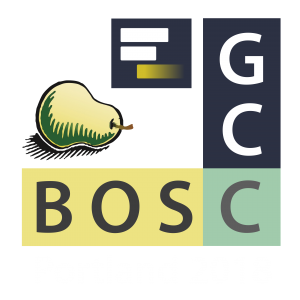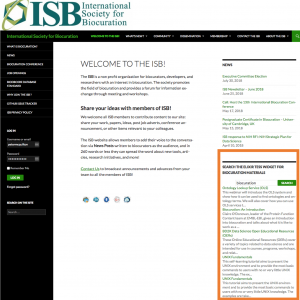Hello! This is the third quarter newsletter for the International Society for Biocuration, a series providing with the latest information on activities and ideas contributed by our community members
Luana Licata’s recap from ISB fellowship visit to EMBL-EBI

By Luana Licata
The short-term fellowship conferred by the International Society for Biocuration (ISB) has given me the opportunity to spend, as a visitor, two weeks, from the 2nd to the 13th of July 2018, at the EMBL-EBI, Hinxton, UK.
At the EMBL-EBI, I have been hosted by the IntAct team and I have worked with the Protein Function Team (EMBL-EBI) and the Gene Annotation Team of the Centre for Cardiovascular Genetics (UCL, London) and with the Molecular Interaction Team (IntAct, EMBL-EBI). Read more here.
Microgrant funding for GCCBOSC 2018

The first joint event of the Galaxy Community Conference and the Bioinformatics Open Source Conference (GCCBOSC 2018) was held from June 25-30 at Portland’s Reed College, and the conference received a microgrant from the ISB to help offer childcare at the conference. To read more, go here
Hackathons for Education and Rapid Prototyping, Research, and Production
By Ben Busby
Solving a scientific problem or building a new bioinformatics tool in just three days – sound impossible? It’s not, when you bring together groups of participants with diverse backgrounds and skill sets in an NCBI-style hackathon! Unlike competitive hackathons, in which many teams vie to create the best solution to a single problem, NCBI-style hackathons are cooperative, with each team tackling its own project, and sharing ideas and expertise with other teams. Participants have ranged from undergraduates to biomedical librarians to front-end developers to senior bioinformaticians, and over the course of 30 hackathons, they’ve developed over a hundred products. They’ve also benefited from the opportunity to learn from and network with their teammates, and the gratification of (hopefully!) creating a cool new tool or resource that can be shared with the scientific community. Since hackathons bring together participants from varied subject matter and computational backgrounds, who typically wouldn’t collaborate otherwise, teams are able to come up with novel and unique solutions that wouldn’t likely come out of a more traditional scientific setting.
If you’re interested in participating in a hackathon, check out the list of upcoming hackathons happening all over the United States (and the world)! No hackathon happening near you? Run your own! A few tips for planning a successful hackathon:
- Be realistic about selecting projects – be sure to pick a problem that can feasibly be solved in three days.
- Make sure to keep your participants fed (and caffeinated) to keep energy and productivity up.
- Document your work and make it open source so that others can benefit from your work.
- Most importantly, have fun and meet some new people!
If you’re interested in learning more about hackathons or seeing examples of projects, visit the Biohackathons page or the Hackathons channel at F1000 Research.
ELIXIR Resources for Biocurators
by Peter McQuilton on behalf of ELIXIR
ELIXIR, an intergovernmental organisation that brings together life science resources from across Europe, has a lot to offer biocurators from across the globe. The goal of ELIXIR is to coordinate these resources so that they form a single infrastructure that makes it easier for scientists to find and share data, exchange expertise, and agree on best practices. ELIXIR activities are grouped into five platforms (Compute, Data, Tools, Training and Interoperability), which are developing a range of bioinformatics services and resources. The Interoperability Platform offers a number of useful resources:
- FAIRsharing (https://www.fairsharing.org) – A manually curated registry of databases (both repositories and knowledgebases), the standards they use (reporting guidelines, ontologies, identifier schema, models and formats), and the funder and journal data policies that recommend their use.
- Identifiers.org (https://www.identifiers.org) – a universal identifier resolution service for data identifier schemes in the life sciences.
- Bioschemas.org (https://www.bioschemas.org) – an extension of schema.org that allows the detailed mark-up of biological datasets, data repositories, training and more. Marked-up webpages are used by ELIXIR services and by the new Google Dataset Search Tool.
In addition, those interested in bioinformatics training can use the ELIXIR Training portal, TeSS (https://tess.elixir-europe.org/). TeSS brings together training materials and events from Europe and beyond and links them to other resources within the ELIXIR infrastructure.
Visit the ELIXIR catalogue of services to find out about the full range of resources available through ELIXIR: www.elixir-europe.org/services. For more information about the ELIXIR Platforms visit: https://www.elixir-europe.org/platforms/
The new ISB-TeSS training widget
By Peter McQuilton
Working with the ELIXIR TeSS Training and Events Portal (https://tess.elixir-europe.org/) and the GOBLET training organisation (https://www.mygoblet.org/), we have added a new widget to the ISB website.

This widget calls the TeSS API directly to provide the latest information on training materials and events around the world. If you have a training event or training materials you would like to add to the widget (which will also mean that material is listed on TeSS and GOBLET) you can add it to the TeSS website here: https://tess.elixir-europe.org/about/registering
Save the date!
12th International Biocuration Conference
West Road concert hall in Cambridge UK will provide the location of the 12th International Biocuration Conference in April 7-10, 2019. This is an ideal forum for biocurators, developers and researchers to collaborate and promote their work within this active and growing community. Participants and submissions are welcome from academia, government and healthcare organisations, and industry. Please check biocuration2019.org, or follow #biocuration2019 on Twitter, for the latest information and details on how to register.

Note that the paper submission deadline for inclusion in the Biocuration virtual issue of Database is October 31st 2018.
Executive Committee Elections
 The Executive Committee Elections will be held this fall for 4 vacancies. The following EC member is up for re-election:
The Executive Committee Elections will be held this fall for 4 vacancies. The following EC member is up for re-election:
The following EC members will be stepping down from the EC:
- Cecilia Arighi
- Suzanna Lewis
- Zhang Zhang
Candidates will be announced on the website by September 28th. The election will run from October 01-08, 2018. Only ISB members are able to vote. More info here: https://www.biocuration.org/isb-ec-elections-2018
Funding Opportunities from the ISB
The ISB offers microgrants to sponsor local and regional short meetings of ISB members to foster synergy of their work efforts.
To promote collaboration and exchange between biocuration groups ISB offers fellowships. The fellowship will fund the visit of a biocurator to another laboratory or organization with extensive experience in biocuration.
Share your news and ideas with the ISB
Have an upcoming paper that you’d like to highlight for the ISB community? Let us know.
We welcome your feedback and ideas. Please contact us at intsocbio@gmail.com

